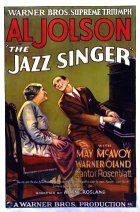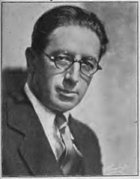
The Jazz Singer Page #11
- UNRATED
- Year:
- 1927
- 88 min
- 1,327 Views
He continues talking about his work. The old man's eyes assume a steely
glitter. Jack continues talking glibly.
238.CLOSE-UP FATHER
He glares at Jack. Finally he holds up a hand for silence, then snaps
out:
TITLE 85:
"So you sing your dirty songs in theayters now!First on the sidewalks, then beer halls and now
theayters."
239.CLOSE-UP GROUP
Sara tries to stop the old man. Jack, surprised at this new attack,
tries to defend himself. The old man doesn't want to listen. Finally
Jack, aroused now to the fact that he must fight to get the respect of
his father, demands that his father listen to him. He grasps his
father's hand. The old man stares at him in surprise. He starts to
protest and Jack silences him.
240.CLOSE-UP JACK
He leans forward as he says, earnestly:
TITLE 86:
"You taught me to sing -- and you told me thatmusic was the voice of God -- and it is just as
honorable to sing in the theater as in the
synagogue."
As Jack finishes title, he endeavors to continue but the old man stops
him. He points to the door. Jack, with a gesture of defeat, turns away
from him, toward the chair upon which are his things.
242.MED. SHOT GROUP
Sara goes to the old man and pleads with him not to be so hard on their
only boy. The old man stiffens and waves her away. Jack starts closing
his bag. The old man picks up the shawl and holds it to him, saying that
he wants nothing bought with his unclean money.
Jack disregards him, closing the bag. Sara takes it and the old man
tells her to burn it if it is not taken away. Jack turns to his mother.
She comes to him, and he puts his arms around her. The old man stands
like a statue waiting for Jack to leave his roof. Sara kisses Jack, and
he kisses her and pats her on the back.
243.CLOSE-UP JACK AND MOTHER
He finally disengages her hands and talks to her soothingly. He picks up
his things and starts to go. Then he turns and faces his father.
244.CLOSE-UP FATHER
He stands looking over Jack's head, silently waiting his departure .
245.CLOSE-UP JACK
He hesitates a moment, then addresses his father quietly. He says:
TITLE 87:
"Some day, Papa, maybe you'll understand thingslike Mama does."
246.MED. SHOT GROUP
The father affects not to hear. He merely points to the door. Jack turns
to his mother, says good-by to her again, and starts toward the door.
The old man stands impassively as Jack passes him on his way out. Sara
makes an impulsive gesture in Jack's direction, but the old man stays
her with a slight movement of his hand.
SLOW FADE OUT:
FADE IN:
247.FULL SHOT STAGE THEATER
The camera is set upstage center and is shooting toward footlights.
There is a row of twenty-four chorus girls downstage, extending across,
all in rehearsal rompers, and they are dancing in unison. As they finish
a kick, a tall lanky figure of a man in shirt-sleeves rises from the
footlights and halts them with a hand in the air. He is Jim Sparks who
puts on the dances, and he starts telling the girls in expressive
language just what he thinks of their efforts and where he thinks they
belong.
248.CLOSE-UP SPARKS
He finishes telling them what he thinks of them, then tells them to
watch him. Although his timing and technique are correct, his efforts,
because of his build and attire, make him appear ludicrous. He stops and
calls to the piano player to do it over again. Addressing the girls, he
says:
TITLE 88:
"Now let's have some life in it -- and don't beafraid of busting anything."
Sparks backs away and the girls go into the steps as he did it. He nods
approvingly. A small group of people appear in the wings on the opposite
side of the stage and stand watching the dancers. There are two men and
a woman.
250.CLOSE SHOT GROUP
Camera is in wings behind them and dancers are seen in the background
going through their evolutions. The girl turns to talk to the man at her
left, and it is seen that she is Mary Dale. The man is Randolph
Dillings, a middle-aged, well-dressed, rather distinguished type, a
well-to-do businessman who finds amusement and sometimes profit in
dabbling in stage enterprises. The other man, somewhat younger, is Harry
Lee, the producer of the show.
251.CLOSE-UP DILLINGS
He looks away from the dancers and says something to Lee.
TITLE 89:
Randolph Dillings whose money was behind thenew edition of "April Follies."
Back. He is talking.
252. CLOSE-UP LEE
He answers Dillings and turns away with a frown.
TITLE 90:
Harry Lee who was staking his reputation as aproducer on the same show.
He is watching the girls and nervously chewing his cigar. He takes out
his watch and looks at it.
253.CLOSE SHOT THREE
Lee turns to Mary and tells her that it is about time that the new
comedian is showing up. Mary smiles and tells him that they needn't
worry about him. Dillings turns to Mary anxiously and says:
TITLE 91:
"You're sure, Mary, that this discovery ofyours can sing as well as Hal Bolton?"
Mary nods and smiles confidently. She says:
TITLE 92:
"He's better than Bolton. You won't be sorryyou took my advice."
The men continue to look worried, however, and Mary starts to tell them
more about the new comedian.
254.EXT. STAGE DOOR
The old man who sits in the doorway looks up and instinctively puts a
foot across the entrance, and a second later Jack Robin appears. He is
not carrying the bag or cane now. Otherwise he appears as he did a few
hours earlier at the home of his father. He tells the old man who he is.
The latter grudgingly admits him.
255.FULL SHOT STAGE FROM WINGS
The three are still in the foreground, and Sparks is drilling the girls
relentlessly. They stop at the end of the dance, and Sparks walks over
to the group. Dillings steps over and starts to talk to him as Jack
comes into the scene. Mary turns as she hears his step and goes to greet
him. Lee stands where he was. Jack stops as he sees Mary. She goes to
him with outstretched hands.
Translation
Translate and read this script in other languages:
Select another language:
- - Select -
- 简体中文 (Chinese - Simplified)
- 繁體中文 (Chinese - Traditional)
- Español (Spanish)
- Esperanto (Esperanto)
- 日本語 (Japanese)
- Português (Portuguese)
- Deutsch (German)
- العربية (Arabic)
- Français (French)
- Русский (Russian)
- ಕನ್ನಡ (Kannada)
- 한국어 (Korean)
- עברית (Hebrew)
- Gaeilge (Irish)
- Українська (Ukrainian)
- اردو (Urdu)
- Magyar (Hungarian)
- मानक हिन्दी (Hindi)
- Indonesia (Indonesian)
- Italiano (Italian)
- தமிழ் (Tamil)
- Türkçe (Turkish)
- తెలుగు (Telugu)
- ภาษาไทย (Thai)
- Tiếng Việt (Vietnamese)
- Čeština (Czech)
- Polski (Polish)
- Bahasa Indonesia (Indonesian)
- Românește (Romanian)
- Nederlands (Dutch)
- Ελληνικά (Greek)
- Latinum (Latin)
- Svenska (Swedish)
- Dansk (Danish)
- Suomi (Finnish)
- فارسی (Persian)
- ייִדיש (Yiddish)
- հայերեն (Armenian)
- Norsk (Norwegian)
- English (English)
Citation
Use the citation below to add this screenplay to your bibliography:
Style:MLAChicagoAPA
"The Jazz Singer" Scripts.com. STANDS4 LLC, 2025. Web. 24 Feb. 2025. <https://www.scripts.com/script/the_jazz_singer_878>.







Discuss this script with the community:
Report Comment
We're doing our best to make sure our content is useful, accurate and safe.
If by any chance you spot an inappropriate comment while navigating through our website please use this form to let us know, and we'll take care of it shortly.
Attachment
You need to be logged in to favorite.
Log In